한식 읽기 좋은 날
Korean Cuisine Spreads Around the World
HANSIK Report from Overseas
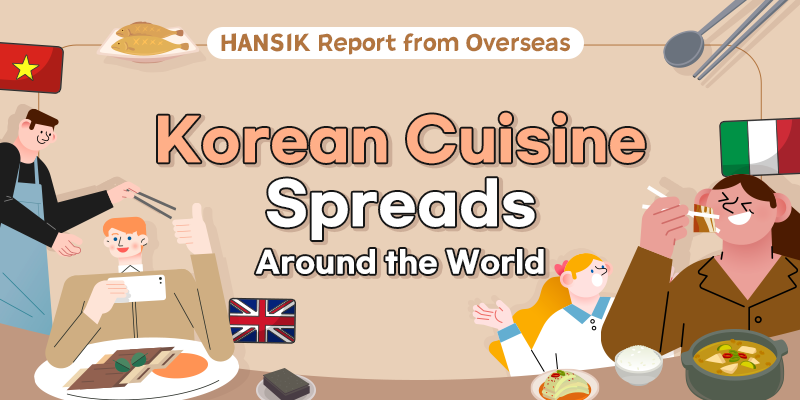
In the United States, a Korean chef has won the 'James Beard Award', the so-called Oscars of the food service industry, and the word 'chimaek' has been added to the Oxford English Dictionary in England, which is called the 'test market' for European market reaction. In Vietnam, not only K-food but also 'K-delivery culture' is gaining popularity. Here, we share stories on the ever-increasing popularity and stature of Korean cuisine and Hallyu in different countries around the world.
References KOTRA Overseas Market News, Chosun Ilbo <The New York Korean chef who won theOscar Award in the food service industry'>, Sisa Journal <[London field report] The secret of the K-food craze that captivated the UK, the 'test market' of Europe>, Maeil Business News <K-delivery culture sees growth as the food-delivery market expands in Vietnam>
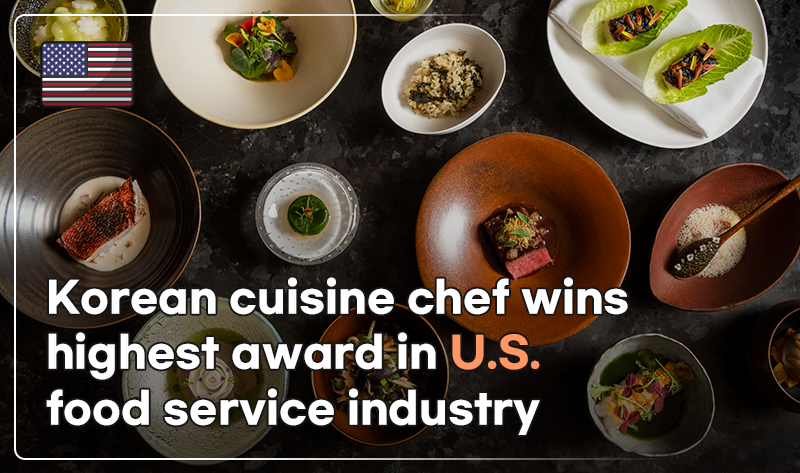
Korean Chef Wins Top Award
in U.S. Food Service Industry
Chef JungHyun Park, a Korean chef who runs the fine-dining restaurant 'Atomix' in New York, USA, has been named the 2023 winner of the 'James Beard Award', which is recognized as the Oscars of the American food industry. The James Beard Award, which has been established in honor of James Beard, an American chef and culinary researcher, selects winners in various categories among over 20,000 restaurants and chefs across the United States who have contributed to the diversification of American food culture each year. As the most prestigious award in the American food service industry, this year's award served as an opportunity to confirm the increased stature of Korean food and Korean restaurants.
'Atomix', run by chef JunghHun Park, is where you can experience Korean culture as well as delicious Korean food through a 10-course menu. Diverse efforts are made to incorporate Korean culture throughout the restaurant, such as tableware collaborated with Korean designers, Korean-design uniforms, and menu cards notated with original Korean names. Chef Park said in an interview, "I love to balance fermented foods, seasonal foods, and ingredients that I am familiar with from when I grew up in Korea."
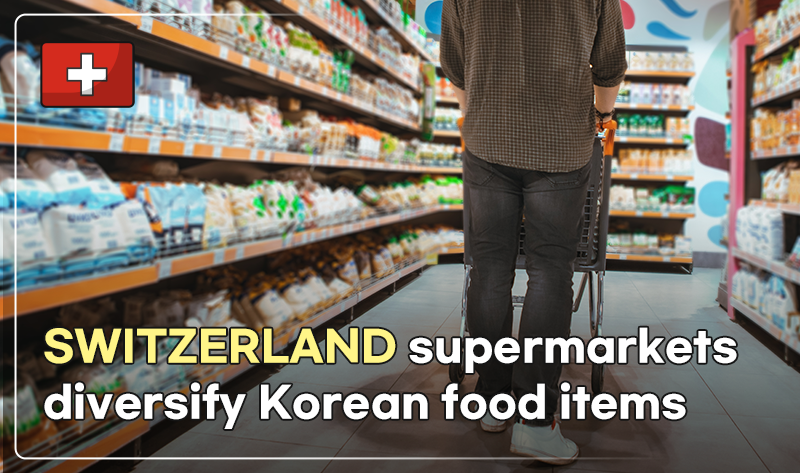
Switzerland Supermarkets Diversify
Korean Products
Korean groceries on display in Switzerland supermarkets are becoming more and more diverse. The website of Switzerland's largest supermarket chain even introduces a variety of Korean recipes that can be prepared with Korean ingredients. It is significant that the Korean food portfolio is expanding in general supermarket chains rather than Asian grocery stores. In fact, the amount of imports of Korean foodstuffs in Switzerland has increased every year, from US$4.85 million in 2018 to more than US$14 million in 2022.
Reports on the popularity of Korean food have also increased in the Swiss media, which recently introduced a wide range of Korean food menus, such as bindaetteok, ganjanggejang, and mandu, in an article titled 'Seoul Gwangjang Market - World's Best Street Food'. Beyond the already world-famous Korean foods such as kimchi and bibimbap, various street foods are also being highlighted. The background can be traced to the popularity of Korean cultural content. As Korean cultural content such as Netflix series, movies, and music gained strong popularity in Europe, Korean food has now formed a trendy food culture across Europe.
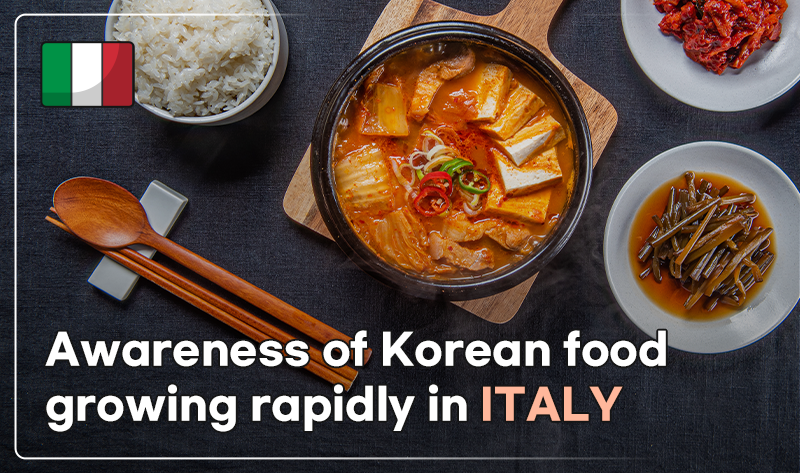
Italy Observes Rapid Increase
in Korean Food Awareness
While Italy may be proud of its food and ingredients, its doors are never shut to foreign food. Rather, the country is perceived to be very curious and open to trying new food. If you walk the streets of Italy, you can easily find a variety of Asian restaurants. Korean food, which has been relatively unknown in Italy compared to Japanese and Chinese food, has recently seen a rapid increase in awareness.
In 2021, a cafe in Rome began selling Dalgona coffee, which became popular based on the success of the Netflix series <Squid Game> and drew a lot of attention by naming the drink after a famous K-pop idol. Earlier this year, the Italian magazine <Donna Moderna> published an article on the attractiveness and healthiness of Korean food, claiming that Korean food is becoming a popular dining out trend in Italy. In recent years, major hypermarkets in Italy also have started to sell various Korean foods, such as kimchi, gim, and ramyeon, and more locals are making Korean dishes themselves. According to a local Italian article, more people are choosing Korean restaurants over all-you-can-eat sushi restaurants, which had been highly favored for weekend dining out. The healthy image of Korean food and Korean traditional desserts that utilize low calorie ingredients compared to Western desserts have met the needs of health-conscious younger generations in Italy. As the popularity of K-content continues, it is an opportune time to expand the Korean food market in Italy by identifying the needs of local consumers.
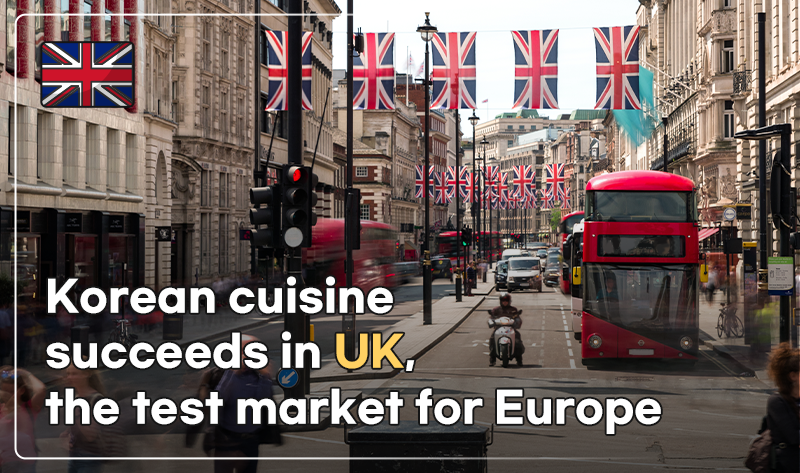
Korean Food Tested and Proved in the U.K.,
the Test Market for Europe
Unlike in the past where you had to go to Koreatown on the outskirts of London to get proper Korean food, now you can easily see long lines at Korean restaurants even in central London. Korean food in the UK is so popular that words such as banchan (side dishes), mukbang, bulgogi, dongchimi, galbi, japchae, gimbap, samgyeopsal, and chimaek, were added to the Oxford English Dictionary in the UK in 2021.
Behind this craze for Korean food is the Netflix hit <Squid Game> and YouTuber 'Korean Englishman'. According to British hypermarket 'Marks & Spencer,' sales of Korean food ingredients such as red pepper paste and Korean style 'BBQ sauce' increased by more than 200% after <Squid Game> aired. YouTube views of the Korean 'Fire Noodle Challenge' skyrocketed, followed by an increase in searches for Korean-style galbi, chicken, and fried rice. The impact of YouTube's 'Korean Englishman,’ who introduced Korean food to the British even before the global Hallyu craze began, has been quite significant. 'Korean Englishman', a popular YouTube channel with 5.6 million subscribers, has been steadily introducing Korean food since it launched in 2013. A video posted by Korean Englishman in 2014 exceeded 18 million views and became a hot topic. The popularity of Korean food in the UK, which began with the influence of content and SNS channels, is expected to continue. Korean cuisine's success in the British market, which has been nicknamed the 'test market for Europe' due to its global floating population, is raising expectations for the expansion of Korean food's presence in the European market.
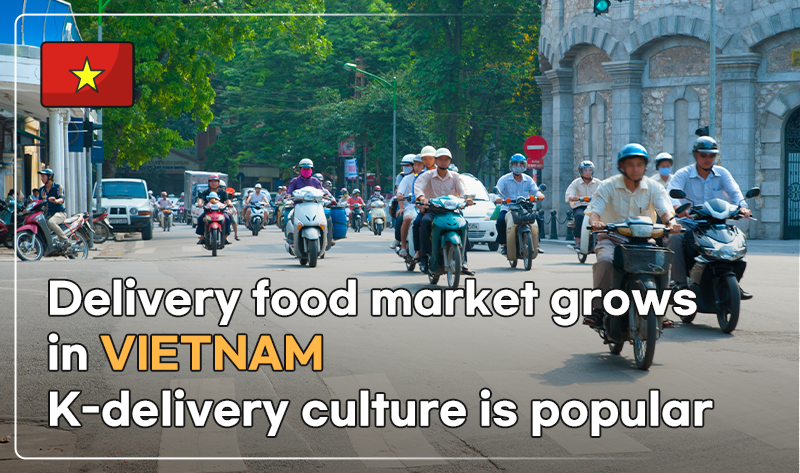
Expansion of Vietnam's Delivery Food Market
Fuels Growth of K-Delivery Culture
Vietnam is one of the countries with the highest interest in K-dramas and K-pop. As such, various Korean cultures, including food culture, are in vogue. Recently, in Vietnam, beyond K-food, even 'K-delivery culture', which is a Korean-style delivery order service, is gaining popularity. An increasing number of the young generation are not only ordering and eating Korean food on a daily basis, but also shopping for groceries and nail art sessions using Korean delivery order apps.
According to Momentum Works, a global market research firm, Vietnam's local delivery ordering app 'BAEMIN', run by Korea's Woowa Brothers, recorded a market share of 12% last year, ranking third in the industry preceded only by Vietnam Grab (45%) and Singapore Shopee Food (41%). Korea's unique fast customer service has been behind Baemin's rapid growth, as it has achieved encouraging results in just four years after entering Vietnam. 'Baedal K' of Delivery K, a Korean company specializing in Korean food targeting Korean tourists in Vietnam, is also rapidly expanding its business through word of mouth. Delivery K has improved the convenience of Korean app users by categorizing the food types and even enabling orders for groceries, massages, and nail business trips. The popularity of not only Korean food but also the culture of consuming Korean food is becoming another measure of the status Hallyu.
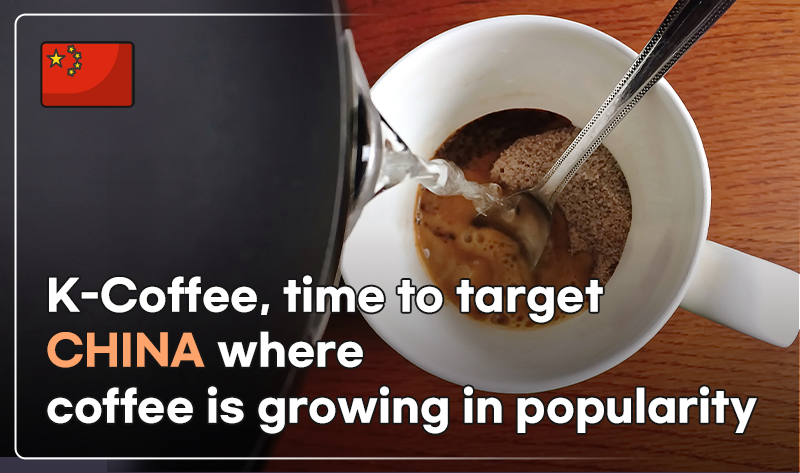
K-Coffee, Time to Target
China's Growing Coffee Popularity
In recent years, coffee has become increasingly popular among young Chinese. As coffee culture becomes popular, the instant coffee market is also growing. According to trade data from the Korea International Trade Association, China's instant coffee imports in 2022 were US$185.4 million, up 44% from the previous year. Korea's coffee imports in China have also grown steadily over the past five years, reaching US$2.8 million in 2022, up 22.4% from the previous year, placing Korea in 10th place among China's major instant coffee importers.
As the standard of living of Chinese consumers improves, the Chinese coffee market is expected to continue to grow, which means that now is a good time for Korea's instant stick coffee, also known as 'K-coffee mix', to penetrate the Chinese market. Korea's K-Coffee Mix, which leads the coffee trend to the extent that a cafe show is held every year, is captivating the Chinese market with its taste and convenience factors. However, considering that Chinese consumers' preferences for coffee are also rapidly changing in line with the rapid growth of its market, it is essential to consistently study the preferences of local Chinese consumers.

 한국어
한국어
 English
English






